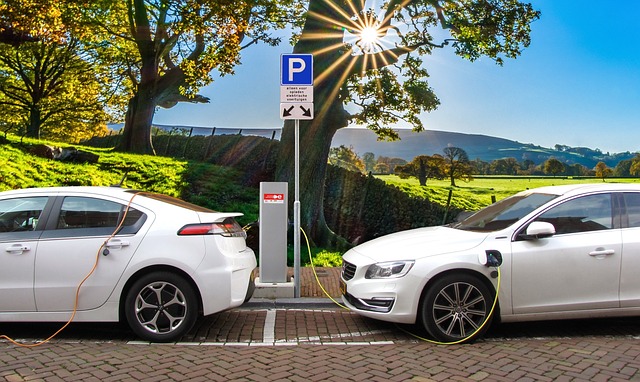Urban commuters face challenges with traditional gasoline vehicles in congested areas and seek eco-friendly alternatives. Hybrids, integrating electric motors and conventional engines, offer improved fuel efficiency and reduced emissions. With incentives and various models available, select hybrid cars cater to diverse budgets and preferences. These vehicles contribute to environmental protection while providing comfort and performance for city dwellers. Choosing the right hybrid model considers budget, features, and environmental impact, making them a sustainable and cost-effective commuting option.
In today’s urban landscapes, navigating congestion and pollution is a daily challenge for commuters. Select Hybrid Cars offer a compelling solution with their fuel efficiency and lower emissions. This article explores the growing appeal of hybrids for city dwellers, delving into the unique challenges of urban commuting, the environmental advantages of hybrid vehicles, and a range of select hybrid cars suitable for different needs and budgets. We also dissect maintenance considerations and peek into future trends shaping urban mobility.
- Understanding Urban Commuting Challenges
- The Rise of Hybrid Vehicles: A Solution
- Types of Hybrid Cars for Commuters
- Environmental Benefits and Cost Savings
- Considerations for Purchase and Maintenance
- Future Trends in Urban Hybrid Mobility
Understanding Urban Commuting Challenges

Urban commuting presents unique challenges that demand innovative solutions. With dense populations and heavy traffic congestion, efficient and eco-friendly transportation options are increasingly vital for modern city dwellers. Traditional gasoline vehicles often fall short in terms of fuel economy and emissions reduction, especially in stop-and-go urban traffic. This is where hybrids step in as a practical alternative.
Selecting the right hybrid car involves understanding these challenges and considering features like hybrid drive trains (what is a hybrid drive train) that seamlessly combine electric motors with conventional engines. Hybrid car incentives and rebates also play a significant role, making these vehicles more accessible to urban commuters on a budget. Additionally, some models offer all-wheel drive capabilities, enhancing control and stability in diverse weather conditions often encountered in urban environments.
The Rise of Hybrid Vehicles: A Solution

In recent years, the rise of hybrid vehicles has signaled a significant shift in urban commuting preferences. As cities become more congested and environmentally conscious, select hybrid cars are gaining popularity as eco-friendly alternatives to traditional gas guzzlers. These innovative vehicles offer a compelling solution by combining efficient electric motors with reliable internal combustion engines, resulting in reduced emissions and improved fuel economy.
With the introduction of top-rated plug-in hybrids in 2023, commuters now have access to even more sustainable options. Popular hybrid models tailored for families and everyday use demonstrate that environmental responsibility can go hand in hand with practicality and comfort. By embracing these cutting-edge technologies, urban dwellers can contribute to a cleaner environment while enjoying the benefits of modern vehicle design and performance.
Types of Hybrid Cars for Commuters

When it comes to choosing a hybrid car for urban commuters, there’s a diverse range of options available that cater to different needs and preferences. One popular option is the best value hybrid cars, like the Toyota Prius and Honda Insight, which offer excellent fuel efficiency and low running costs without breaking the bank. These models are renowned for their reliability and robustness, making them ideal choices for daily commutes in congested city spaces.
For those seeking a bit more luxury and comfort, there are premium hybrid vehicles that blend advanced technology with eco-friendly performance. The Toyota Camry Hybrid and Lexus RX 450h provide smooth rides, sophisticated interiors, and impressive fuel economy. Additionally, the longevity of hybrid car batteries is a significant advantage, ensuring peace of mind for commuters who rely on their vehicles for daily transportation. To find your ideal model, visit the nearest hybrid car dealer to test drive options and explore financing plans tailored to urban commuters.
Environmental Benefits and Cost Savings

Select Hybrid Cars offer a compelling combination of environmental benefits and cost savings for urban commuters. By leveraging advanced technology like electric motors and fuel-efficient engines, hybrid vehicles significantly reduce greenhouse gas emissions compared to their traditional counterparts. This eco-friendly approach translates into cleaner air and a smaller carbon footprint in densely populated cities.
Moreover, the financial advantages are substantial. While initial costs might be higher than conventional cars, hybrid car incentives and rebates, along with lower fuel consumption, make them a cost-effective choice in the long run. The best fuel-efficient hybrid trucks and high-performance hybrid sports cars exemplify this balance between performance and sustainability, catering to diverse commuter needs while promoting a greener future.
Considerations for Purchase and Maintenance

When considering a select hybrid car for urban commuting, there are several factors to keep in mind regarding purchase and maintenance. Firstly, evaluate your budget, as hybrid vehicles can range from affordable compact models to more expensive luxury options. Additionally, look into government incentives or tax breaks for eco-friendly vehicles, which can help offset the initial cost.
Maintenance costs for hybrids are generally lower than conventional cars due to their fuel-efficient design and fewer moving parts. Regular maintenance such as oil changes, tire rotations, and battery checks should be part of your routine. Remember that hybrid batteries have a longer lifespan but still require careful monitoring, and replacement can be costly. Considering hybrid cars with all-wheel drive might offer enhanced safety features, but they typically come with higher price tags and fuel consumption rates compared to their front-wheel-drive counterparts. Keep an eye on the latest eco-friendly hybrid models for potential savings on how to save on hybrid car insurance through updated technologies and efficient designs.
Future Trends in Urban Hybrid Mobility

The future of urban mobility is set to be dominated by hybrids, with a growing trend towards sustainable and efficient transportation options. As environmental concerns continue to rise, cities worldwide are embracing hybrid vehicles as a viable solution for urban commuters. The market for select hybrid cars has seen tremendous growth, offering various models tailored to different needs, including popular hybrid models designed for families. These vehicles provide an eco-friendly alternative to traditional gas-powered cars without compromising performance.
One of the key drivers behind this shift is the advancement in hybrid powertrain technology. Hybrid powertrains combine a conventional internal combustion engine with one or more electric motors, allowing for improved fuel efficiency and reduced emissions. This technology enables select hybrid cars to navigate urban environments with ease while offering drivers a smoother and quieter ride. With ongoing advancements, we can expect even more efficient and powerful hybrid models to hit the roads, making them an increasingly attractive option for urban commuters seeking both performance and sustainability.
Urban commuters now have a powerful solution at their disposal with hybrid vehicles, offering an efficient and eco-friendly mode of transportation. By selecting the right hybrid car, commuters can navigate city streets while reducing environmental impact and saving on fuel costs. As technology advances and infrastructure evolves, the future of urban mobility looks set to be dominated by hybrids, providing a sustainable and cost-effective commute for years to come.
